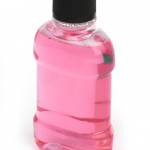
Chlorhexidine mouthwash has been available many years and is readily available. It has been shown to reduce plaque and gingivitis in the short term (Dental Elf – 3rd Apr 2017), and is often recommended following oral surgery procedures with reviews demonstrating reductions in dry socket (Dental Elf – 13th Mar 2017).
The main aim of this review was to evaluate the benefits of chlorhexidine rinsing after periodontal or implant surgery in terms of plaque and inflammation reduction potential.
Methods
Searches were conducted in the Medline/PubMed, Embase and Cochrane library databases. Randomised controlled trials (RCTs) comparing chlorhexidine mouth rinsing following periodontal or implant surgery were considered. Two reviewers independently screened studies, abstracted data and assessed study quality using the Jadad Scale. The main outcome measures were plaque index (PI) and bleeding-on-probing (BOP), staining, periodontal probing depth (PPD) and patient acceptance were also considered.
Results
- 11 RCTs were included.
- 4 RCTs (82 patients) compared chlorhexidine against placebo.
- All 4 studies reported reductions in plaque accumulation, these ranged from 29-86% at one week and between 51-82% at 2 weeks.
- Reductions in BOP across the 4 studies ranged from 0 -73% at 1 week.
- No differences were seen for wound healing and epithelialisation.
- 2 studies assessed pocket probing depth finding no additional benefit with chlorhexidine .
- 7 studies compared different chlorhexidine formulations including different chlorhexidine concentrations, alcohol-free and those with anti-discoloration system.
Conclusions
The authors concluded: –
Chlorhexidine rinsing helps to reduce biofilm formation and gingival inflammation after surgery. However, no additional reduction of periodontal probing depth over any given placebo or control solution could be found irrespective of whether chlorhexidine was used or not.
Comments
While the authors have searched 3 major databases only 11 small RCTs were included with only 4 RCTs comparing chlorhexidine against placebo. The reviewers have also chosen to use the Jadad scale to assess study quality, an approach that is not recommended the Cochrane Collaboration. We know from previous reviews that chlorhexidine reduces plaque and gingivitis so the main findings from the review are not unexpected. Three of the included studies were of split-mouth design which a likely to suffer from cross-contamination when assessing mouthwash use. So overall while the review suggests a benefit from chlorhexidine particularly compare to a placebo the available evidence is limited and of low to very low quality.
Links
Primary Paper
Solderer A, Kaufmann M, Hofer D, Wiedemeier D, Attin T, Schmidlin PR. Efficacy of chlorhexidine rinses after periodontal or implant surgery: a systematic review. Clin Oral Investig. 2019 Jan;23(1):21-32. doi: 10.1007/s00784-018-2761-y.Epub 2018 Dec 7. Review. PubMed PMID: 30535817.
Other references
Dental Elf – 3rd Apr 2017
Dental Elf – 13th Mar 2017
Chlorhexidine gels and rinses reduce dry socket after third molar extraction
